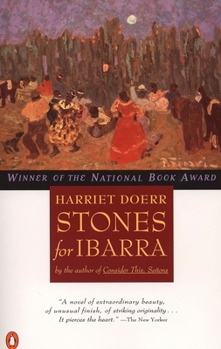Stones for Ibarra: National Book Award Winner
Select Format
Select Condition 
Book Overview
Winner of the National Book Award for First Work of Fiction "A very good novel indeed, with echoes of Gabriel Garc a M rquez, Katherine Anne Porter, and even Graham Greene."--The New York Times Richard and Sara Everton, just over and just under forty, have come to the small Mexican village of Ibarra to reopen a copper mine abandoned by Richard's grandfather fifty years before. They have mortgaged, sold, borrowed,...
Related Subjects
Grief Identity Loss Memory Small Towns Tradition Vs Modernity Literary Fiction Contemporary Domestic Life FictionCustomer Reviews
I was deeply touched
No Stones Thrown
a flawless narrative - a minor masterpiece
One Of The Greatest, and Most Underrated Books of Our Time
Stones for Ibarra
Stones for Ibarra Mentions in Our Blog

We literally wouldn’t be here without our seniors, so celebrate the ones in your world for their role in creating and bringing you into it by spending time with the older, wiser, ‘been there, done that’ crowd today. But first, keep reading for a list of famous authors who either started writing late in life or kept writing until they were, well, OLD!





